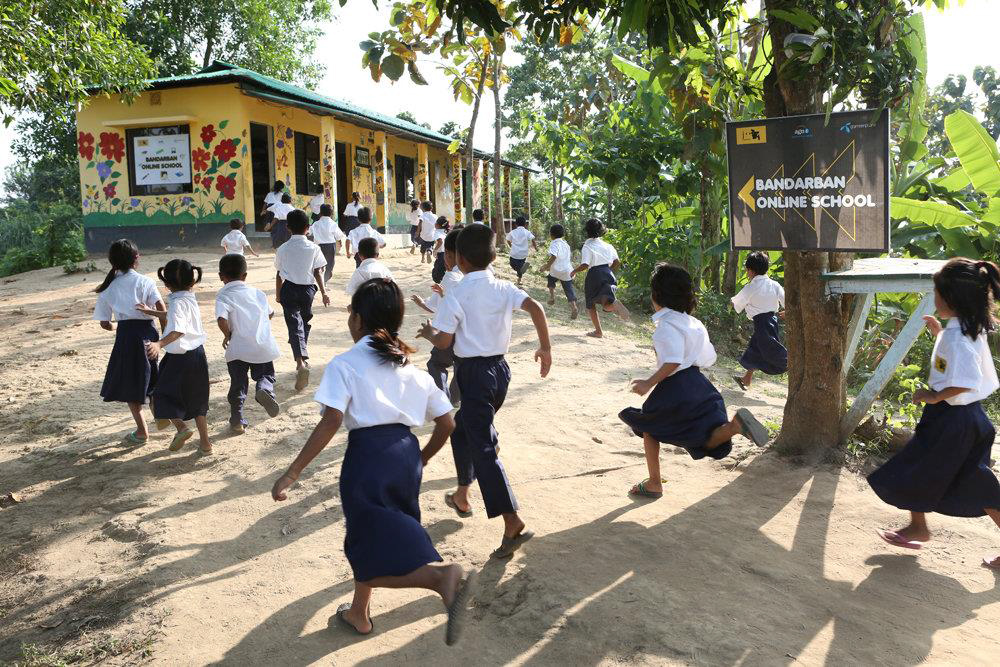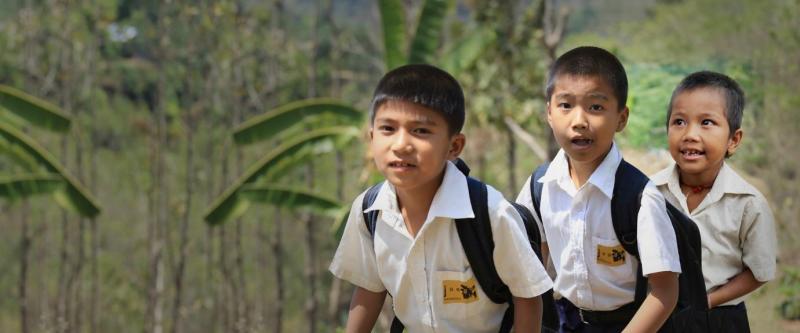
Korvi Rakshand is the founder of JAAGO Foundation, a non-profit organization that focuses on education and youth development in Bangladesh. In 2015, he won the second prize of the Japanese Award for Most Innovative Development Project (MIDP) of 10,000 USD for his digital schooling approach with solar energy in remote areas in Bangladesh.
Starting the digital school concept for quality education
During his education to become a lawyer, Korvi Rakshand started working on setting up free-of- cost quality schools for underprivileged children in Dhaka. Together with friends, he started JAAGO Foundation, which in 2007 set up its first school in Dhaka based on online education. At the time, the traditional education system in Bangladesh was struggling with problems, such as the unavailability of teachers, limited capacity, and extremely large number of students in a single class. These issues led to low-quality education and in turn, to low school attendance rates.
JAAGO came up with the idea to set up a digital school to guarantee access to high quality education for all its students. In a pre-pandemic era, this was an innovative and unfamiliar concept. With JAAGO’s approach, children would have a large part of their classes taught via a television screen, with the local teacher supporting these high-quality classes with interactive elements. With a generator and the internet, they were able to roll out their education model in the capital city.
However, when in 2010 they scaled up to schools outside of Dhaka, they faced huge challenges with regard to electricity and internet reliability. This was an even bigger issue in the most vulnerable and remote areas of the country, where the need for improved education was greater. Here, the unreliable connection and low-quality of education in particular, led to low school attendance and achievements.
It is at this juncture that JAAGO Foundation brought forward the idea to pilot the use of solar energy to guarantee access to quality online education in remote rural schools. At the time, solarizing schools was an innovative and new idea, as clean energy was not as valued and common as it is now in Bangladesh. JAAGO Foundation decided to pilot this approach in their primary school in Bandarban, in the border area of Bangladesh. This remote area is vulnerable to conflict, faces low investments, high poverty rates and holds various Rohingya refugee settlements.
Impact of winning the award
JAAGO Foundation submitted this pilot idea to GDN and was awarded with a Japanese Award for Most Innovative Development Project in 2015. The awards were handed out during a conference in which cross-learning between the participants was facilitated. Korvi shared that, “The GDN award conference was a get together of change makers, which was really great.”
During the event, he was able to attend workshops, speeches and practical trainings. He appreciated in particular, the trainings focused on how to convey a story through a short and effective message. This was much needed since the organization was yet to receive exposure and attention for their work at the time. The press release published by GDN helped draw attention to this initiative, making JAAGO Foundation and their innovative work widely known across the globe. This publicity was crucial for the organization’s reputation and eventually led to new partnerships and opportunities.
With the development grant (MIDP), JAAGO Foundation was able to buy and implement solar panels at the Bandarban school. The community’s response to the pilot was very promising. Teachers responded positively, as they were no longer stuck between classes and could give more time and attention to each group of children. JAAGO Foundation was able to interest and attract more children to attend school, as classes were now consistent and uninterrupted. As a result, school attendance at the Bandarban school increased by 20-25% to over 500 students. After the pilot started, the exam results of the students improved significantly as well. Children returned home enthusiastic and happy, which in turn sparked interest among their parents and led to a positive butterfly effect throughout the community.
“This was a happy and positive development,that provided the much-needed boost for us, as an organization.”

The positive attention led to partnerships. For example, the local government became interested in collaborating with JAAGO, after seeing what the solar energy system looked like. Through the grant, JAAGO was able to demonstrate that their solarized online education model worked well in remote areas. For the Bandarban school specifically, JAAGO Foundation is now partnering with UNICEF to continue its work.
“I knew it would work. We did some studies but we were unable to try out the innovation until we won the GDN award,” shares Korvi.
After witnessing the successful implementation of their concept, JAAGO Foundation planned to execute their idea in other regions. However, there were challenges to upscaling the solarized approach, such as the expensive method, and the need for abundant land to position enough solar panels to cater to multiple classrooms at the same time. Despite this, Korvi and his organization received appreciation for their effort, that led to support for JAAGO Foundation. Currently, the organization is still using the solarized approach in some remote locations even though internet and power access have improved significantly in Bangladesh over recent years.
Korvi recalls,“In 2010, some people were laughing as they did not understand what we were talking about. During the pandemic, online education became popular, and suddenly people wanted to learn from us.”
JAAGO Foundation successfully piloted a model that is being adopted by many other organizations, especially now that clean energy has become more prominent in Bangladesh. Not only did the solarized pilot strengthen the organization’s belief in its idea, but also in itself. Currently, JAAGO Foundation is working with 11 schools, and provides education to over 4,500 children in Bangladesh. To achieve this, the organization works with 50,000 volunteers and 400 employees. In 2017, JAAGO Foundation was recognized by UNESCO as the best organisation in the world to use Information and Communication Technology (ICT) in education. A proper research paper is being written on their unique approach in Bandarban.
Plans and ambitions for JAAGO Foundation
Korvi Rakshand’s aim is to set an example and inspire others to replicate their education model. Therefore, JAAGO Foundation’s current focus is on further improving the quality on their existing schools, instead of expanding at a fast pace. Now that they have more students attending, the organization aims to take the existing schools from grade 7 up to grade 10, so that children
can graduate and directly go to college. There are focused efforts to enhance the digitalisation infrastructure in each school, through more televisions, routers and classrooms. Korvi’s ambition remains to extend this initiative to rural areas to provide schooling to vulnerable children and make sure no one is left behind.
Read other impact stories from the Global Development Awards Competition.
About the Global Development Awards Competition
The Global Development Awards Competition (GDAC) is an award scheme that identifies talent, supports the career advancement of researchers in developing countries, and funds innovative social development projects, implemented by NGOs, to benefit marginalized groups in the developing world. The award categories include the Japanese Award for Outstanding Research on Development (ORD), the Japanese Award for Most Innovative Development Projects (MIDP), and the Japan Social Development Fund Award (JSDF). Learn more.





